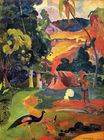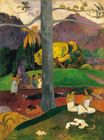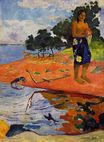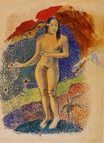Paul Gauguin - Olden times 1892
 |
 |
 |
 |
 |
 |
 |

Olden times 1892
91x69cm oil/canvas
Thyssen-Bornemisza Collection, Lugano-Castagnola, Madrid, Spain
The image is only being used for informational and educational purposes
<< Previous G a l l e r y Next >>
From Thyssen-Bornemisza Collection:
Gauguin had gone to Tahiti in order to get to know the ancient Maori civilisation, jeopardised by colonisation and Christianisation. He wanted to revive through his paintings those sacred "olden times" in which man lived in harmony with nature and find again, far from Europe, the escaped gods and the original paradise. Shortly after his arrival, he set off on a trip around the island to discover the places still preserved from the corruption and decadence he found in Papeete. "Leaving the path that borders the seashore, I went deep into the thicket which rises quite far into the mountain. Got to a small valley. There some inhabitants want to live as they did in olden times." These few lines, hastily written in the first manuscript of Noa noa, were developed in the final version and are the explanation given by the artist of his painting Mata Mua, a true hymn in the honour of the Maori woman: "In times of richness, social importance, national glory, when the autochthonous race reigned in the Islands and had not yet welcomed the foreigner, in the era of the gods, Matamua! The legend finds its substance everywhere in this naturally fabulous land, but it is the feminine deity Hina, the goddess of lie and pity, who appeals most to those people from the past. The moon has its feasts celebrated with embraces, with Songs, with Dances, celebrated by Nature through ineffable prodigies. [...] The women remain faithful to the dead gods due to an instinctive nostalgia. Their pleasures and terrors always inhabit Matamua. This is how the artist sees the childish and majestic woman, who symbolises an entire ancient race, and he has given her the task to express in the painting the secrets he stole from the extinct cult of which she was both the idol and the priestess, and from nature, of which she is a kind of marvellous synthesis."